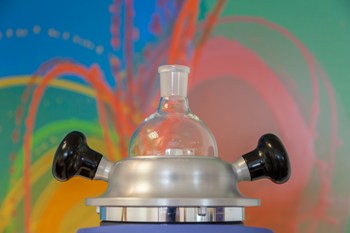The School of Chemistry at the University of Nottingham (UK) has placed a sizeable order with Asynt to upgrade their undergraduate teaching facilities with DrySyn Scholar Plus heating block systems.
The School of Chemistry at the University of Nottingham (www.nottingham.ac.uk/chemistry/index.aspx) is one of the leading Chemistry departments in the UK and is recognised internationally for its world leading research portfolio, excellence in teaching and extensive engagement with Industry. Its expertise spans the spectrum of modern chemical technology including synthesis, analysis and characterisation, ranging from the core chemistry disciplines to areas at the interface with biological sciences and engineering (sustainable chemical processing).

In 2012 GlaxoSmithKline (GSK) and The University of Nottingham formalised a collaboration to establish a new laboratory to accommodate a Centre of Excellence for sustainable chemistry, and to construct an innovative carbon neutral sustainable chemistry facility.
David Chambers-Asman, Director of Operations & Administration at the School of Chemistry commented 'In line with Nottingham's commitment to develop ‘green and sustainable’ chemistry methodologies, we wanted to find a safe, more environmentally friendly alternative to heated oil baths for our undergraduates to learn about organic synthesis'.
He added 'After reviewing the market we elected to invest in Asynt DrySyn Scholar heating block systems because of their robustness, enhanced operator safety features and ease-of-use - making them the ideal for our organic synthesis'. 'As we teach hundreds of students in each year of our undergraduate Chemistry courses using, heated oil baths presented a risk to our students (through accidental spillage) and involved periodic requirement to dispose of large quantities of oil - a risk and environmental burden eliminated by using the DrySyn Scholar Plus'.
Specifically designed for safety conscious teaching laboratories - the DrySyn Scholar Plus kit enables single 50ml, 100ml or 250ml round bottom flask reactions to be performed safely without the mess or inherent hazards of a hot oil bath or heating mantle. Prominent permanently fixed lifting handles ensure moving even hot reaction blocks are easy, fast and safe. Compatible with almost any magnetic hotplate stirrer, the low thermal mass design of the DrySyn Scholar minimises both power consumption and reaction heat-up time.
For further information, or to request a product demonstration, please visit www.asynt.com/product_view.php?ProductID=142 or contact Asynt on +44-1638-781709 / [email protected].
Asynt is a leading supplier of affordable products, consumables and services for chemists in industry and academia. With staff of trained chemists - Asynt is able to draw upon this in-depth applications knowledge to provide a high level of customer support for its DrySyn Heating Blocks, Controlled Lab Reactors, Synthesis Tools, Evaporators, Circulators, Temperature Control Systems, Vacuum Pumps and Laboratory Safety Equipment